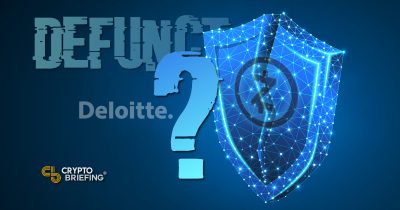Zcash Is A "Defunct Initiative", Says Deloitte Blockchain Specialist
Despite some of its faults, Monero has some crucial advantages.

Share this article
One of Deloitte’s blockchain specialists has said that the privacy coin Zcash (ZEC) will struggle to develop a long-term use case because it ultimately relies on trust and could end-up jeopardizing users.
Tim Davis is a Deloitte Principal who acts as a primary consultant for companies looking at integrating blockchain into their businesses. He told Crypto Briefing at Consensus in New York that Zcash had “inherent flaws” stemming from the way it was set-up.
“Zcash is a defunct initiative”, he said. “It will only go so far”.
Zcash was created in a complex ceremony involving multiple computers from all across the world. Known as multi-party computation (MPC), it is designed to prevent malicious actors using “toxic waste” to create counterfeit coins on the network, by splitting it up and destroying the computers involved.
The initial MPC ceremony has been heavily criticized. Many argue that there’s no absolute guarantee that any actor could not piece the toxic waste together and have the ability to print ZEC tokens at will, without anyone else knowing.
Davis’ main worry is that too much rests on trusting that the Zcash MPC ceremony was performed effectively. “Zcash’s inherent flaw is that it relies on trust”, he said. It’s too much of a risk for companies and serious players to use a network that someone may have left open backdoor access.
Zcash’s current valuation on the market is actually misleading, believes Davis. “There’s a lot of herd money in the crypto sector,” he said. “Popularity attracts capital and because Zcash was fast out of the gate, it’s built up a strong following regardless of the asset itself.”
Although Davis doesn’t think Monero (XMR) is completely perfect, he did say that a recent ‘key image’ protocol update allows users to check the circulating supply.
“If someone was printing XMR,” Davis said, “other users would see a spike in volume and could quickly deduce it was compromised.”
“That’s something, at least”, he added.
That Whole Privacy Thing
Privacy on the blockchain is currently a matter of major debate – whether it be total anonymity or just confidentiality surrounding transactions, according to Davis.
Although permissioned blockchains, such as R3’s Corda platform, which provides confidentiality between two business parties, have seen a surge of interest in the past year or so, businesses “introducing privacy characteristics creates issues with regulators as well as on chain problems”, said Davis.
The same problems affect Zcash as well. A private transaction can be very expensive; although much smaller than they once were following Sapling they still take up a lot of computational power.
David Byrd, a representative from Ernst & Young, another global consultancy that provides consultation for businesses interested in blockchain, said expensive and power intensive transactions mean that most of the activity on Zcash doesn’t use zk-SNARKs and remains public.
Crypto Briefing approached the Electric Coin Company, the chief developer behind the Zcash protocol, for comment. We had not received a reply by the time we went to press.
